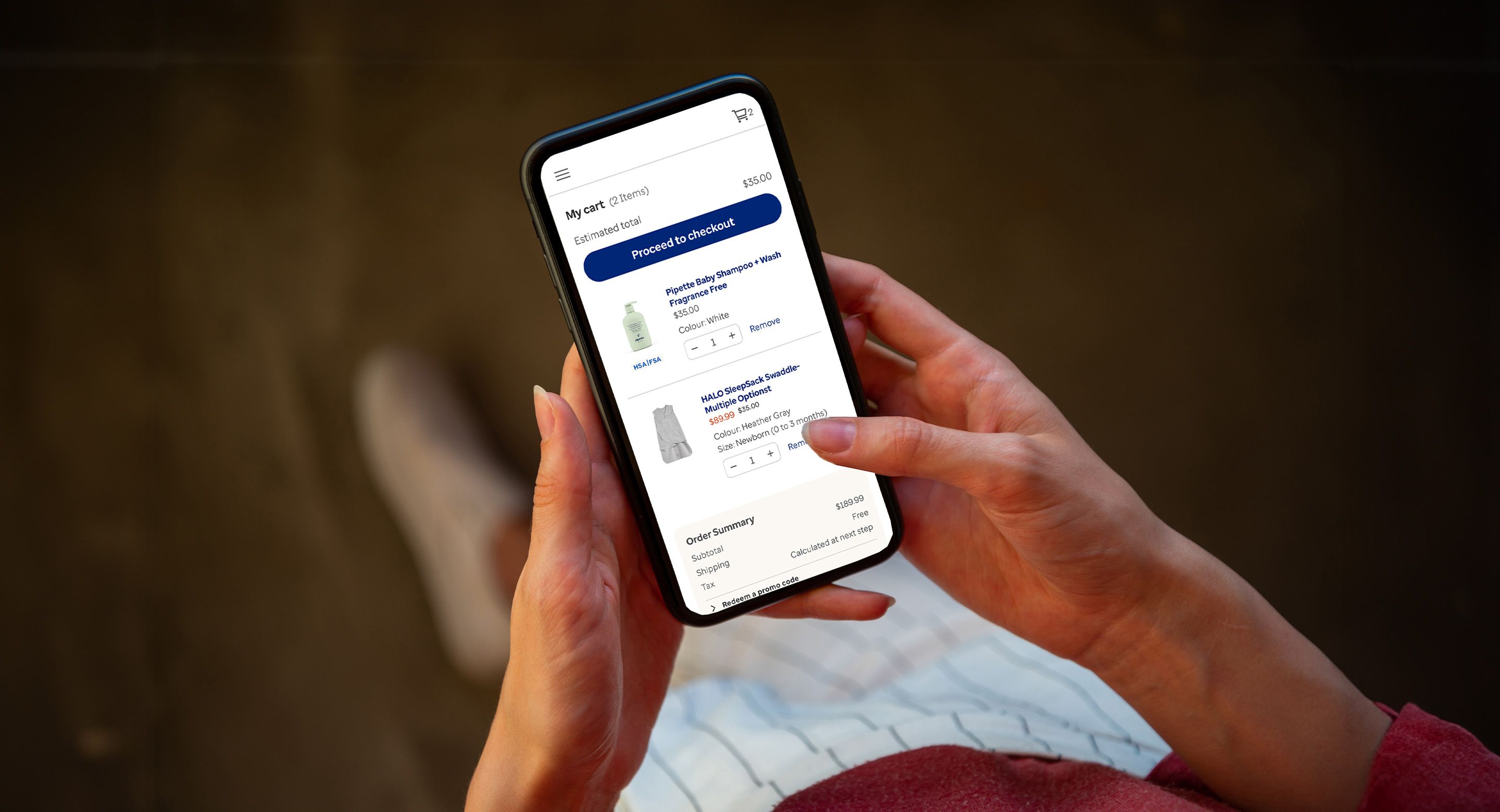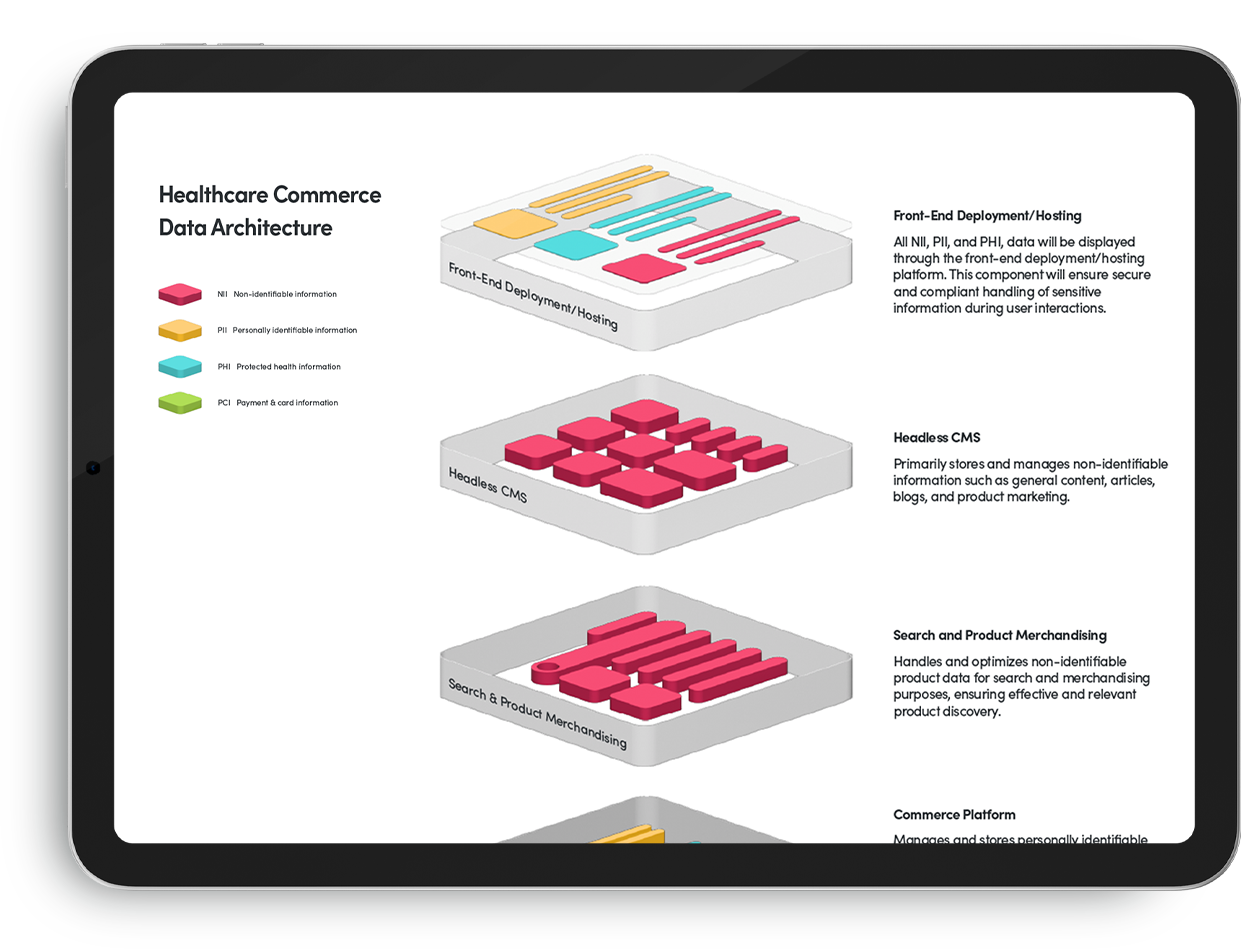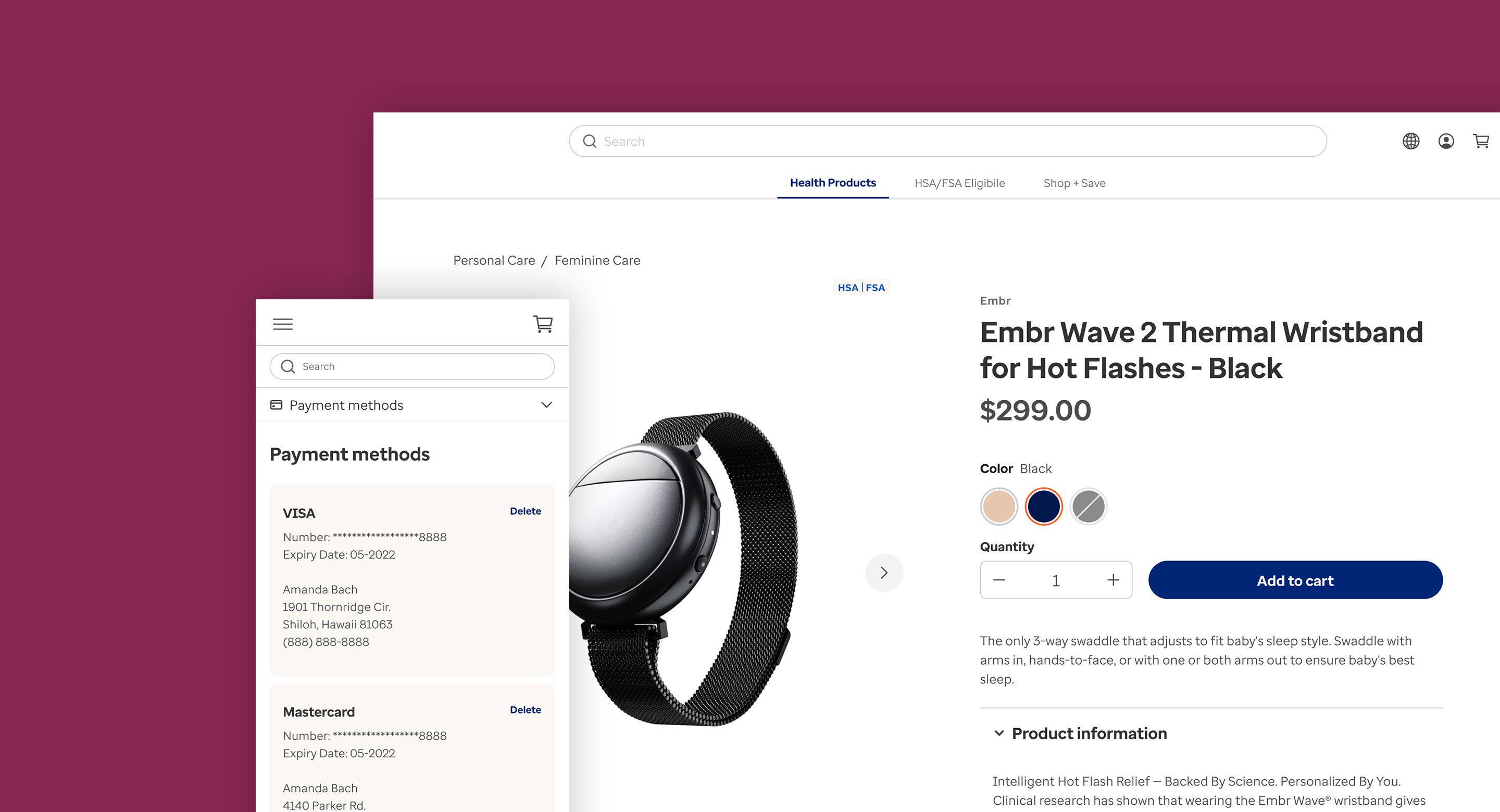Accelerating Healthcare Commerce with Composable Architecture
How Orium partnered with a leading healthcare provider to deliver a secure, scalable commerce experience in record time.

The healthcare industry is experiencing a digital transformation, with patients and providers seeking more efficient, accessible, and personalized healthcare experiences. As healthcare organizations look to modernize their commerce capabilities, they face unique challenges in delivering secure, compliant, and user-friendly digital solutions that meet both patient needs and regulatory requirements.






The Challenge
The client needed to bring together multiple services - commerce, research-backed health content, and provider support - into a single, seamless experience. But their existing systems couldn't keep pace. Previous attempts to implement third-party solutions had failed, leaving them with a fragile promotions engine and an unstable PIM.
At the same time, they faced one of the toughest regulatory environments of any industry. Healthcare applications demand the highest standards for data protection, and customer trust hinges on the secure handling of sensitive information. The organization needed a platform that would not only improve performance and user experience but also adhere to HIPAA and other compliance requirements from day one.

The Strategy
Orium helped the client move beyond the traditional "build vs. buy" trade-off to embrace a "build + buy" approach, showing how composable commerce makes it possible to do both. By combining best-of-breed solutions like commercetools, Algolia, Contentful, Netlify, and Stripe with tailored development where it mattered most, Orium delivered a modular, API-first architecture that balanced flexibility, scalability, and smart investment of resources.
The choice wasn't just about technology; it was about risk mitigation and time-to-value. Orium worked closely with the client's leadership team to map out scope, validate capabilities, and showcase exactly how a composable approach could solve their pain points. This collaborative sales cycle built confidence in the solution and accelerated decision-making.
When the engagement began, the client was already developing a companion app designed to serve health and wellness content— a kind of digital publication for articles, news, and expert advice. Orium's strategy centered on connecting that editorial experience to commerce. The vision was seamless: if a user read an article about managing diabetes, the interface would surface related products in context, allowing them to move naturally from education to purchase without friction or any visible transition between systems.
Working in a co-delivery model, Orium embedded a well-sized engineering team alongside the client's developers, pairing delivery with education. Their technical lead served not only as an architect for the composable build but also as a consultant to other internal teams, guiding decisions around commerce versus ERP responsibilities, PIM integration, analytics, and infrastructure.
This approach ensured that while Orium accelerated delivery, the client's team was learning in parallel, absorbing both the technical and operational principles of composable architecture. The goal wasn't just to deliver a solution but to help the organization think composable and adopt the processes, roles, and mindset that would sustain it.
At the same time, Orium addressed challenges in the client's existing CMS and blog setup. As the commerce and content applications merged, shared and reusable components were introduced to unify the experience and avoid redundant work. Marketing teams gained smoother workflows, while developers gained flexibility to extend and maintain shared modules across both experiences.
Orium also helped adapt the client's complex multi-dimensional product model from their PIM into commercetools, preserving all existing functionality and ensuring variant-rich products could be managed without compromise.

A Complete Healthcare Commerce Solution
Built on composable architecture, this solution combines the best tools for healthcare commerce while maintaining HIPAA compliance and meeting the unique needs of health and wellness providers.
The Solution
With a tight timeline, the teams turned to Orium's Industry Solution for Health & Pharma Commerce as the foundation. This pre-built framework provided integrations out of the box with Contentful for CMS, Algolia for search, Stripe for payments, and Netlify for deployment, helping the project move faster than a ground-up implementation while still allowing for customizations to meet the client's unique needs.
A HIPAA-compliant checkout flow was built to ensure that no personally identifiable information was transmitted through endpoints. Authentication was integrated with HSID for a familiar and compliant single sign-on experience. Stripe handled payments and tax management, enhanced with IIAS eligibility checks for HSA/FSA validation. And Netlify provided scalable hosting configured to securely pass data through without storage, meeting compliance needs for frontend infrastructure.
Beyond compliance, the build prioritized intelligent, seamless interactions. The commerce and content apps were integrated using a micro-frontend architecture, allowing both systems to remain independent while sharing key components including headers, footers, product carousels, cart, and global search. Users could move effortlessly between reading and shopping experiences without perceiving any boundary between the two.
To reduce marketing rework and maintain visual consistency, Orium designed a shared Contentful strategy where content branches could feed both applications. The same reusable components were used to surface stories, products, and promotions dynamically across pages.
Personalization was powered through "smart" product carousels, which could be curated by marketing within the CMS or automatically driven by Algolia Recommend, leveraging machine learning to tailor product suggestions to each user's behavior.
Event-driven integrations were also a key part of the architecture. Orium guided the client through best practices for a cloud migration and event-based design, ensuring data flowed in near real time between commercetools and internal systems. Meanwhile, the analytics layer within Orium's accelerator was configured to send browser events directly to the client's CDP, giving their data teams faster visibility and actionable insights while preserving PII and PHI protections.
This combination of modern tools and compliance-driven customizations gave the client a future-ready platform tailored to healthcare's unique demands.
Orium also provided a thorough documentation package and post-launch recommendations, including a roadmap for evolving the architecture further, such as merging the content and commerce apps into a single experience in the future. The engagement closed not just with a delivered product, but with an empowered internal team, equipped to manage and extend their composable ecosystem with confidence.

Outcomes & Next Steps
In less than six months, the new commerce experience went from project kickoff to ready-to-launch. The accelerated timeline allowed the organization to create entirely new experiences with new services for their market quickly, while building long-term confidence in their digital capabilities.
The results included:
- A HIPAA-compliant, composable commerce solution built for scale
- Faster time-to-market, thanks to Orium's accelerator and expertise
- A foundation for continued expansion, with the flexibility to add or swap solutions as the platform evolves
For the client, this project was more than just a launch, it was a proof point that composable commerce can succeed in highly regulated industries, and how deep expertise, proven accelerators, and a collaborative approach can unlock innovation even in the most complex sectors.


